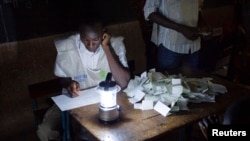BAMAKO —
Vote counting is underway in Mali following Sunday's presidential run-off election, meant to be a turning point from more than 18 months of conflict and political crisis.
Election agents in polling stations around Bamako counted ballots as night fell Sunday.
Dozens of young men waited anxiously outside their polling station at the Nelson Mandela school in Commune 2 to be the first to hear the results.
One of them, Yacouba Konate, said "we need to be the eyes and ears of our candidate. Mali needs change. This country belongs to us, the young people, and it was up to us to show it, to motivate people to come out and vote."
Voting went off largely without incident around the country.
The sun came out in Bamako at mid-day after scattered morning rainfall.
A citizen's observer mission said rains in the Bamako district, as well as in the Kayes and Koulikoro regions, could have affected turnout, which appeared slightly lower than the record 49 percent during the first round of voting on July 28.
Polling officials in the capital said turnout appeared the same or a bit lower than the first round, due also to the recent Muslim holiday.
Voters like Amadou Sanga said they came out because the election was too important to miss.
He said "this election will decide what comes next, whether or not we can get out of what has been a major crisis. We can't make the same mistakes again. We are here to choose a leader who can get us out of this situation once and for all."
A lot is riding on this election. It will unlock $4 billion in international aid already pledged to rebuild the country and it will mark an end to the political limbo that followed the March 2012 military coup.
Mali is now host to a massive U.N. mission aimed at stabilizing the north, which was occupied by rebel and Islamist armed groups for nine months.
Presidential candidate Soumaila Cisse is a technocrat from Timbuktu in the north. His campaign has focused on economic recovery. He faces candidate Ibrahim Boubacar Keita, a one-time prime minister and former National Assembly president from the south. He is known for his "say it like it is" demeanor and fierce nationalism.
Keita appears to be the frontrunner. He led the first round with 39 percent of ballots and almost all of the other 26 first-round candidates are backing him in the run-off.
Election authorities have until Friday to announce results from Sunday's run-off.
French, Malian and U.N. troops provided security for Sunday's vote.
A local journalist in the far northern rebel stronghold of Kidal told VOA that voter turnout as of mid-day appeared higher than the dismally low participation seen there during the first round.
The election took place in Kidal under a temporary cease-fire deal signed in mid-June between Tuareg separatist group, the MNLA, and Mali's interim government.
Amadou Maiga contributed to this report from Bamako.
Election agents in polling stations around Bamako counted ballots as night fell Sunday.
Dozens of young men waited anxiously outside their polling station at the Nelson Mandela school in Commune 2 to be the first to hear the results.
One of them, Yacouba Konate, said "we need to be the eyes and ears of our candidate. Mali needs change. This country belongs to us, the young people, and it was up to us to show it, to motivate people to come out and vote."
Voting went off largely without incident around the country.
The sun came out in Bamako at mid-day after scattered morning rainfall.
A citizen's observer mission said rains in the Bamako district, as well as in the Kayes and Koulikoro regions, could have affected turnout, which appeared slightly lower than the record 49 percent during the first round of voting on July 28.
Polling officials in the capital said turnout appeared the same or a bit lower than the first round, due also to the recent Muslim holiday.
Voters like Amadou Sanga said they came out because the election was too important to miss.
He said "this election will decide what comes next, whether or not we can get out of what has been a major crisis. We can't make the same mistakes again. We are here to choose a leader who can get us out of this situation once and for all."
A lot is riding on this election. It will unlock $4 billion in international aid already pledged to rebuild the country and it will mark an end to the political limbo that followed the March 2012 military coup.
Mali is now host to a massive U.N. mission aimed at stabilizing the north, which was occupied by rebel and Islamist armed groups for nine months.
Presidential candidate Soumaila Cisse is a technocrat from Timbuktu in the north. His campaign has focused on economic recovery. He faces candidate Ibrahim Boubacar Keita, a one-time prime minister and former National Assembly president from the south. He is known for his "say it like it is" demeanor and fierce nationalism.
Keita appears to be the frontrunner. He led the first round with 39 percent of ballots and almost all of the other 26 first-round candidates are backing him in the run-off.
Election authorities have until Friday to announce results from Sunday's run-off.
French, Malian and U.N. troops provided security for Sunday's vote.
A local journalist in the far northern rebel stronghold of Kidal told VOA that voter turnout as of mid-day appeared higher than the dismally low participation seen there during the first round.
The election took place in Kidal under a temporary cease-fire deal signed in mid-June between Tuareg separatist group, the MNLA, and Mali's interim government.
Amadou Maiga contributed to this report from Bamako.




